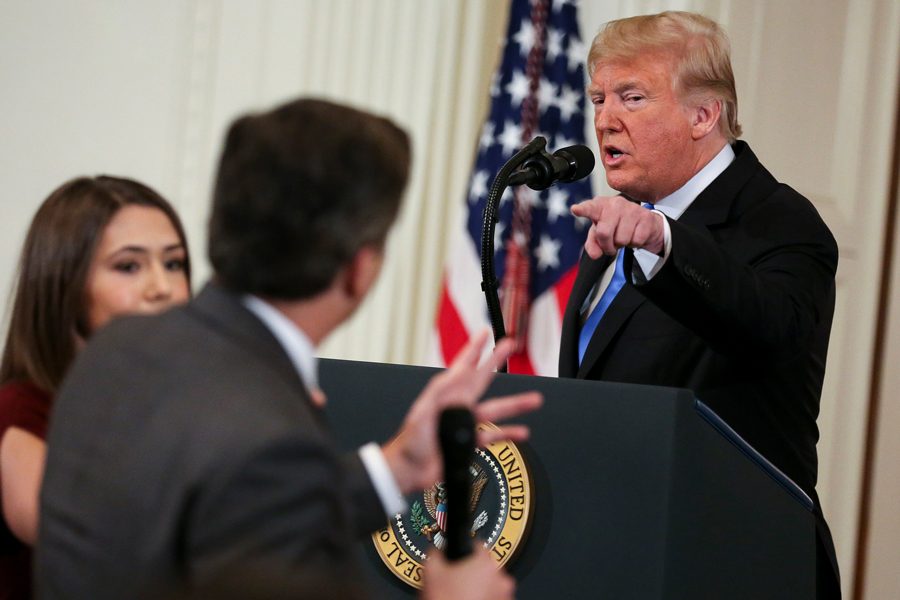Medill interim dean speaks out against White House’s removal of journalist’s press pass
(Oliver Contreras/Sipa USA/TNS)
A White House staff member, left, tries to take away the microphone from CNN White House correspondent Jim Acosta during an exchange with President Donald Trump on Wednesday, Nov. 7, 2018. Medill interim Dean Whitaker spoke out against the president’s decision to revoke Acosta’s credentials in a statement on Friday.
November 9, 2018
The interim dean of the Medill School of Journalism, Marketing, Integrated Marketing Communications is speaking out against the Trump administration’s decision to revoke a CNN reporter’s White House credentials after he aggressively questioned the president on his characterization of the migrant caravan as an “invasion” and the Russia investigation.
“It is incredibly disconcerting when journalists are censured for doing their job, and we cannot turn a blind eye to this encroachment on press freedom, a concept that is enshrined in the Constitution,” Charles Whitaker, the interim dean of the Medill, said in a statement. “Our democracy depends on the functioning of an unfettered press that is allowed to question our leaders and hold them accountable without fear of reprisal.”
Whitaker stopped short of directly criticizing the president, and instead echoed the broad concerns of press freedom advocacy groups, who say journalists’ basic right to cover the government has been curtailed since Trump stepped into office.
The statement is a remarkable gesture from Medill, a respected stalwart in the journalism industry that sends many of its graduates to national publications, including CNN.
“It is important, too, that an institution as prominent as Medill stand up for our profession — that we insist that our students and our professional colleagues are allowed to perform their roles honorably and without being declared ‘enemies of the state,’” Whitaker said.
In an interview with The Daily last month, Whitaker said the school’s curriculum doesn’t respond to political climates.
“I think journalism in general doesn’t adapt to politics,” he said. “Our role is to cover politics.”
But with an administration that often unleashes attacks against the press, journalists are finding it hard to distance themselves from politics.
Yet Whitaker told The Daily on Sunday that the goal of the statement wasn’t to send Medill into the political arena but to affirm journalism’s importance at a time when it seems to come under attack.
“We as a society don’t think nearly enough about what we will lose if we lose American journalism,” he said. “It’s now a moment for journalism schools to not just train smart young people but to remind the public of the importance of journalism.”
Medill freshman Megan Lebowitz said she was “very glad” Whitaker spoke out on the Acosta’s censure.
“It’s an important issue — there are so many attacks on the press,” she said. “I think it’s important journalism institutions like Northwestern defend the press and speak out.”
The tense relationship between Trump and reporters came to a climax earlier this week, when the president lashed out against Jim Acosta, CNN’s chief White House correspondent, during a post-midterm press conference. Acosta, a confrontational reporter known to challenge the president, had pushed back against previous remarks that a caravan of migrants from Central America making its way toward the U.S. was an “invasion.”
Trump, who that day had tried to declare a Republican victory despite the Democrats’ takeover of the House of Representatives in the midterm elections, called Acosta a “rude, terrible person” before attempting to move on.
Acosta refused to give up the microphone when a female White House aide reached for it. The administration later revoked his access to the White House, falsely claiming that Acosta had handled the aid roughly. On Friday, the president signalled he was considering limiting access to other reporters as well.
Sophia Scanlan contributed reporting.
Email: aperez@u.northwestern.edu
Twitter: @_perezalan
Email: dvesurai@u.northwestern.edu
Twitter: @@dvesurai


